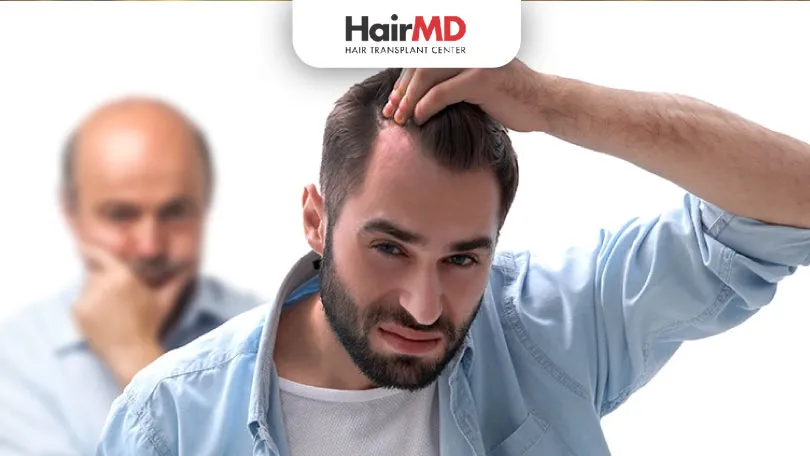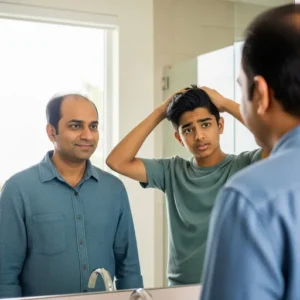
Hair loss is a common concern for millions, and at Hair Specialist Clinic Pune, we understand that not all hair loss is the same. For many, genetic factors play a significant role in hereditary hair loss. But how much do your genes really influence hair loss, and what can be done about it?
At Hair Specialist Clinic Pune, we explore the causes, prevention methods, and the impact of genetics on hair restoration. Our advanced hair restoration techniques can help you overcome genetic challenges and achieve lasting results. Let us guide you on your journey to healthier, fuller hair.
What’s covered in the article?
- Genetic Hair Loss
- Hereditary Hair Loss Conditions
- Diagnosing Genetic Hair Loss Early
- Preventing Genetic Hair Loss
- Is Hair Restoration the Best Option for Genetic Hair Loss?
- Take Control of Genetic Hair Loss Today
Genetic Hair Loss
Before exploring solutions, it’s crucial to understand what makes genetic hair loss unique. Unlike hair loss caused by stress, lifestyle, or medical conditions, hereditary hair loss is deeply rooted in your DNA. It often results in progressive thinning, primarily on the scalp, and affects men and women differently.
For men, this most commonly manifests as male pattern baldness, which usually starts at the hairline or crown. For women, it’s known as female pattern baldness and is more likely to cause overall thinning rather than bald patches.
What Causes Genetic Hair Loss?
Genetic hair loss occurs due to a sensitivity to dihydrotestosterone (DHT), a hormone derived from testosterone. Certain genetic variations can make your hair follicles more sensitive to DHT, causing them to shrink over time. This process, called miniaturisation, results in thinning hair and, eventually, baldness.
While this sensitivity is often inherited, the genes responsible for patterns of hair loss can come from either parent, debunking the myth that baldness comes solely from your maternal grandfather.
Can Your Genes Affect Hair Transplant Success?
If you’re considering hair restoration surgery, you may wonder whether your inherited traits could impact the procedure’s success. The answer lies in the quality of the donor hair.
Hair transplants involve relocating healthy follicles from one part of the scalp (usually the back or sides) to areas of thinning or baldness. Since the donor hair is typically resistant to DHT, the success of the transplant depends more on the availability and condition of these DHT-resistant follicles rather than specific genetic factors.
However, a proper assessment by a qualified hair care clinic will determine whether a genetic predisposition could affect outcomes. Seeking expertise from experienced professionals ensures a tailored strategy based on your unique genetic condition.
Can Your Genes Affect Hair Transplant Success?
If you’re considering hair restoration surgery, you may wonder whether your inherited traits could impact the procedure’s success. The answer lies in the quality of the donor hair.
Hair transplants involve relocating healthy follicles from one part of the scalp (usually the back or sides) to areas of thinning or baldness. Since the donor hair is typically resistant to DHT, the success of the transplant depends more on the availability and condition of these DHT-resistant follicles rather than specific genetic factors.
However, a proper assessment by a qualified hair care clinic will determine whether a genetic predisposition could affect outcomes. Seeking expertise from experienced professionals ensures a tailored strategy based on your unique genetic condition.
Hereditary Hair Loss Conditions
Hair loss can be a challenging experience, both physically and emotionally. Hereditary hair loss is one of the most common causes, and understanding it is the first step toward finding solutions. With the right knowledge and care, these conditions can be managed effectively, helping you regain confidence and take control of your hair health.
Several hereditary conditions can contribute to hair loss. Below, we cover the most common ones.
Androgenetic Alopecia
This is the medical term for male and female pattern baldness. Androgenetic alopecia affects up to 50% of men by age 50 and is also the leading cause of hereditary hair loss in women.
Alopecia Areata
Though often tied to autoimmune disorders, some cases of alopecia areata can be linked to genetic predispositions. This condition leads to sudden, patchy hair loss and sometimes progresses to total scalp hair loss (alopecia totalis).
Hypotrichosis
Hypotrichosis is a rare genetic disorder that results in little to no scalp or body hair. This condition is caused by specific genetic mutations and can be present at birth or develop during childhood.
Diagnosing Genetic Hair Loss Early
Spotting hair loss early can make a big difference in managing it. Sometimes, genetic testing can reveal if you’re more likely to experience hair loss, though it’s not something most people do. Instead, digital scalp analysis and regular visits to a hair care clinic can help catch signs like miniaturisation or other issues before hair loss becomes a bigger problem.
Early diagnosis opens up more opportunities to explore both prevention and treatment options, so don’t hesitate to seek professional guidance if you notice changes in your hair density.
Preventing Genetic Hair Loss
Preventing hereditary hair loss may not always be possible, but slowing its progression is entirely achievable. Here are some effective methods to consider:
Medications
- Finasteride (commonly known as Propecia) is an FDA-approved medication that inhibits DHT production, reducing its impact on hair follicles.
- Minoxidil (sold as Rogaine) is a topical treatment that promotes hair growth and slows shedding.
Lifestyle Changes
Adopting a healthy lifestyle can complement medical treatments. Regular exercise, a balanced diet rich in vitamins (like Biotin and Vitamin D), and stress management can improve overall hair health.
Low-Level Laser Therapy (LLLT)
Low-level laser devices stimulate hair growth by improving blood circulation to the scalp. While results can vary, LLLT is considered a safe, non-invasive treatment for genetic hair loss.
Hair Care Products
Some shampoos and serums are designed to block DHT and nourish the scalp. Look for products containing ingredients like ketoconazole or caffeine, known to support hair retention.
Is Hair Restoration the Best Option for Genetic Hair Loss?
When genetic hair loss becomes advanced, hair restoration may offer the most reliable solution. Modern techniques in hair restoration include the following options:
Follicular Unit Transplantation (FUT)
FUT involves removing a strip of skin containing hair follicles and transplanting it to the affected area. This method is ideal for those needing maximum follicle density.
Follicular Unit Extraction (FUE)
Follicular Unit Extraction FUE is a minimally-invasive technique where individual hair follicles are extracted and transplanted. It leaves no visible scars in the donor area and is preferred for those seeking a less invasive option.
Scalp Micropigmentation
For those not ready or suitable for surgery, scalp micropigmentation creates the illusion of a fuller head of hair by applying pigment to the scalp.
Non-Surgical Options
Don’t overlook advanced wigs or hair systems, which have come a long way in mimicking natural hair. Alongside treatments, they can restore confidence as you explore other options.
DO YOU KNOW?
Nearly 250 Patients Visit HairMD
Everyday For Various Hair Concerns
(15+ Years Of Expertise. 4157+ Successful Hair Transplant)
Meet Our Dermatologists
Take Control of Genetic Hair Loss Today
While genetic hair loss may feel like it’s out of your control, understanding your condition and seeking early intervention can make all the difference. From lifestyle changes to advanced hair restoration techniques, there are solutions to suit every stage of hair loss.
At HairMD Clinic, we specialize in providing expert advice tailored to your unique needs. Our team is dedicated to helping you take the first step towards restoring your confidence. Remember, today’s small changes can lead to a lifetime of healthy, beautiful hair. Reach out to HairMD Clinic and start your journey today.
Further Reading
Redensyl vs Minoxidil: Which is the Better For Hair Growth?
Confused between Redensyl and Minoxidil? Discover which treatment works best for hair growth and how to choose the right one for you.
QR678 for Hair is Better than GFC? An Honest Opinion by a Board-Certified Hair Dermatologist
IV drip for hair growth delivers essential vitamins directly into the bloodstream to reduce hair fall and improve hair quality. Doctor-guided treatment.
7 Benefits of IV Drip Therapy for Healthy Hair
Discover how IV drip therapy nourishes hair follicles, reduces hair fall, and improves hair growth. The doctor explained the benefits.
IV Drip for Hair Cost in Pune | HairMD Doctor Guide
IV drip for hair growth delivers essential vitamins directly into the bloodstream to reduce hair fall and improve hair quality. Doctor-guided treatment.











